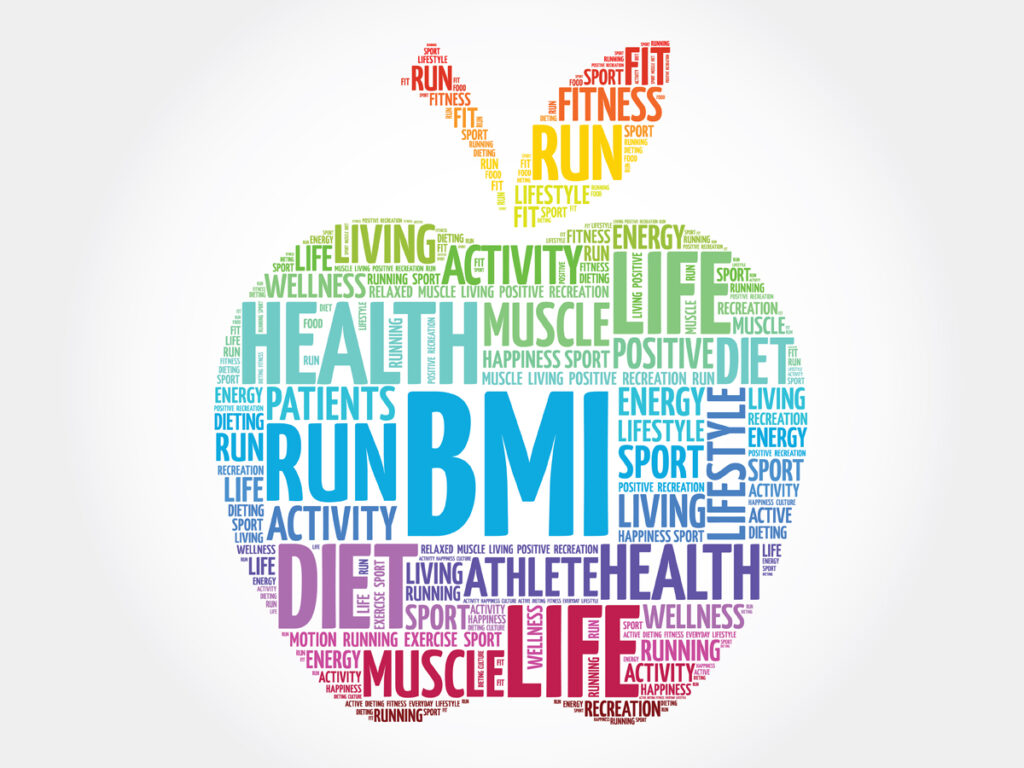Body mass index (BMI) is an easy, inexpensive way for adults to determine approximately how much body fat they have. It’s calculated the same for children and teens but is interpreted differently depending on their age and gender. To calculate BMI, you simply divide a person’s weight by the square of their height. The higher the number, the more body fat a person is said to have. For example, if a person measures 6 feet tall and weighs 160 pounds, their BMI is 21.7.
The American Cancer Society offers an online calculator so you can easily calculate your BMI. The result will tell you which weight-group category you fit into:
- BMI less than 18.5 = Underweight
- BMI 18.5 to 24.9 = Normal weight
- BMI 25 to 29.9 = Overweight
- BMI 30 and higher = Obese
Why is BMI important?
Your BMI should be checked at least once per year during your physical exam, as it can help determine your overall health risks and what, if any, treatments might be needed. BMI can be used as a predictor for health problems like:
- Cardiovascular (heart and blood circulation) disease
- Gallbladder disease
- High blood pressure (hypertension)
- Type 2 diabetes
- Osteoarthritis
- Colon cancer
- Breast cancer
- Depression and other mental health disorders
If your BMI result shows you are overweight, it’s important to make certain lifestyle changes to lower the risk of several diseases. Here are a few small changes you can make to help you lose weight:
- Move your body
Start looking for excuses to move your body. Watching TV? Try jumping jacks or running in place. Shopping? Park in the back of the lot and take the stairs, when possible. Listening to music? Start a dance party. Find an activity you enjoy that increases your heart rate. The Centers for Disease Control and Prevention (CDC) recommends at least 30 minutes of physical activity a day, 5 days a week. - Limit processed foods and baked goods
Packaged, processed foods and baked goods are high in sodium, fat and sugar, so it’s important to limit them as much as possible from your diet. If you enjoy chips, cookies, crackers or candy, choose one to eliminate per week until you’re at no more than one or two. Replace these with healthier snacks like Greek yogurt and fresh berries, peanut butter and apples, and baby carrots and hummus. - Stay hydrated
Sometimes, people mistake thirst for hunger, which can lead to extra snacking throughout the day. Instead of reaching for another snack, try drinking a glass of water to feel satiated. You can also add more water-rich foods into your diet like watermelon, cucumbers, apples, lettuce and peaches. - Get plenty of rest
Adults should get between 7-9 hours of sleep every night. Those who regularly sleep less than that have a higher risk of weight gain, diabetes, high blood pressure, heart disease, stroke and depression. - Pack your lunch
Preparing your own lunch can help you control not only portion sizes and quality but also the amount of sugar, salt and fat you’re consuming (which can be significantly higher in restaurant foods). - Try strength training
Basic bodyweight exercises can help you build muscle and lose weight without going to the gym or using equipment. Focus on these fat-losing, muscle-building exercises to lower your BMI: knee push-us, squats, crunches, lunges and chair dips. - Keep a food journal
Learn how to make better food choices by writing down everything you eat. This also helps you better understand your eating habits. Do you crave salty foods every day around 4 p.m.? Keep a healthy snack within reach to help you make smarter choices. Journaling can also help you visualize your routine and highlight what changes are right for you.
Knowing your personal body mass index can help you and your doctor determine whether you’re at risk for developing serious health conditions and take preventative measures to help lower those risks and restore a healthy height-to-weight ratio.
Visit Thibodaux Regional Urgent Care – Thibodaux for a physical exam and to find out your BMI. Our skilled physicians can help you set realistic weight loss goals and make the appropriate lifestyle changes so you can lower your BMI and improve your overall health.
Visit our center for your back-to-school, sports or work physical today. We’re open for walk-in appointments 7 days a week from 9 a.m. – 8 p.m.




